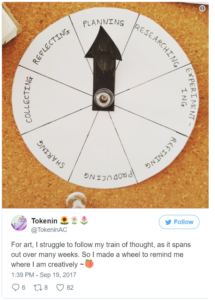(This column is posted at www.StevenSavage.com and Steve’s Tumblr)
This Tweet got me thinking:

Neat idea for a creative person, right? Tracking their creative stages? It’s a good example of a creative person finding a way to work with their inspiration and habits. It’s a system.
Good creatives, successful creatives, have systems. You can hear about the Snowflake Method, or the “X Habits of Whatever,” or endless ideas of how to write novels, or best ways to do art. You doubtlessly have your own way of organizing your creativity – even if you’re not aware of it. For all our raging imaginations, it seems we creative people often make ways to organize that fire that burns inside of us.
There are several reasons we do this – reasons we’re not always aware of, but by bringing it into awareness I hope it helps you make your own.
We organize our creativity to ensure things get done. Being creative is nice, but if there’s no end result, there’s little point unless you’re doing something freeform.
We organize our creativity to provide focus. So we make sure we don’t loose track, so we can bring projects to completion, so we don’t start anything new.
We organize our creativity to speed time to completion. We get structure and organization, milestones and ways to track progress – so that creative dream sees the light of day.
We organize our creativity to embody our principles. We take ideas of what matters, our mad methods, our special tricks and make them formal so we can use them that much easier.
Finally, an an oft missed benefit, is that by organizing our creativity we can find ways to improve. When you build a system of ideas, of tracking, of documenting you can use that to find new ways to do better. That organization of imagination can inspire you to think up new ways to get better.
So, go on, take a look at your creativity. What systems and methods do you have? What could you build? How can you provide enough structure to your dreaming to make you dream better?
(Remember I do all sorts of books on creativity to help you out!)
– Steve